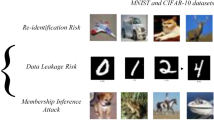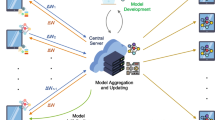Abstract
With the continuous promotion and deepened application of Machine Learning-as-a-Service (MLaaS) across various societal domains, its privacy problems occur frequently and receive more and more attention from researchers. However, existing research focuses only on the client-side query privacy problem or only focuses on the server-side model privacy problem, and lacks a simultaneous focus on bilateral privacy defense schemes. In this paper, we design privacy-preserving mechanisms based on differential privacy for the client and server side respectively for the first time. By injecting noise into query requests and model responses, both the client and server sides in MLaaS are privacy-protected. Experimental results also demonstrate the effectiveness of the proposed solution in ensuring accuracy and providing privacy protection for both the clients and servers in MLaaS.
Access this chapter
Tax calculation will be finalised at checkout
Purchases are for personal use only
Similar content being viewed by others
References
Reinsel, D., Gantz, J., Rydning, J.: Data Age 2025: the evolution of data to life-critical. https://www.seagate.com/files/www-content/our-story/trends/files/Seagate-WP-DataAge2025-March-2017.pdf. Accessed Aug 2023
mordor intelligence, machine learning as a service (MLaaS) market size & share analysis-growth trends & forecasts (2023–2028). https://www.mordorintelligence.com/industry-reports/global-machine-learning-as-a-service-mlaas-market
Amazon marketplace. https://aws.amazon.com/marketplace. Accessed Aug 2023
Google cloud AI. https://cloud.google.com/solutions/ai. Accessed Aug 2023
Azure machine learning. https://azure.microsoft.com/en-ca/free/machine-learning. Accessed Aug 2023
Tanuwidjaja, H.C., Choi, R., Baek, S., et al.: Privacy-preserving deep learning on machine learning as a service-a comprehensive survey. IEEE Access 8, 167425–167447 (2020)
De Cristofaro, E.: A critical overview of privacy in machine learning. IEEE Secur. Priv. 19(4), 19–27 (2021)
Qayyum, A., Ijaz, A., Usama, M., et al.: Securing machine learning in the cloud: a systematic review of cloud machine learning security. Front. Big Data 3, 587139 (2020)
Acar, G., Eubank, C., Englehardt, S., et al.: The web never forgets: persistent tracking mechanisms in the wild. In: Proceedings of the. ACM SIGSAC Conference on Computer and Communications Security, vol. 2014, pp. 674–689 (2014)
Tramèr, F., Zhang, F., Juels, A., et al.: Stealing machine learning models via prediction APIs. In: 25th USENIX Security Symposium (USENIX Security 16), pp. 601–618 (2016)
Chen, Q., Chai, Z., Wang, Z., et al.: QP-LDP for better global model performance in federated learning. In: 2022 18th International Conference on Mobility, Sensing and Networking (MSN). IEEE, pp. 422–426 (2022)
Chen, Q., Wang, H., Wang, Z., et al.: LLDP: a layer-wise local differential privacy in federated learning. In: 2022 IEEE International Conference on Trust, Security and Privacy in Computing and Communications (TrustCom). IEEE, pp. 631–637 (2022)
Fredrikson, M., Jha, S., Ristenpart, T.: Model inversion attacks that exploit confidence information and basic countermeasures. In: Proceedings of the 22nd ACM SIGSAC Conference on Computer and Communications Security, pp. 1322–1333 (2015)
Shokri, R., Stronati, M., Song, C., et al.: Membership inference attacks against machine learning models. In: 2017 IEEE Symposium on Security and Privacy (SP). IEEE, pp. 3–18 (2017)
Shokri, R., Shmatikov, V.: Privacy-preserving deep learning. In: Proceedings of the 22nd ACM SIGSAC Conference on Computer and Communications Security, pp. 1310–1321 (2015)
Mohassel, P., Zhang, Y.: SecureML: a system for scalable privacy-preserving machine learning. In: 2017 IEEE Symposium on Security and Privacy (SP). IEEE, pp. 19–38 (2017)
Hesamifard, E., Takabi, H., Ghasemi, M., et al.: Privacy-preserving machine learning in cloud. In: Proceedings of the 2017 on Cloud Computing Security Workshop, pp. 39–43 (2017)
Zheng, W., Popa, R.A., Gonzalez, J.E., et al.: Helen: maliciously secure coopetitive learning for linear models. In: 2019 IEEE Symposium on Security and Privacy (SP). IEEE, pp. 724–738 (2019)
Ristenpart, T., Tromer, E., Shacham, H., et al.: Hey, you, get off of my cloud: exploring information leakage in third-party compute clouds. In: Proceedings of the 16th ACM Conference on Computer and Communications Security, pp. 199–212 (2009)
Sweeney, L.: k-anonymity: a model for protecting privacy. Internat. J. Uncertain. Fuzziness Knowl. Based Syst. 10(05), 557–570 (2002)
Machanavajjhala, A., Kifer, D., Gehrke, J., et al.: L-diversity: privacy beyond k-anonymity. ACM Trans. Knowl. Discov. (TKDD), 1(1), 3-es (2007)
Ribeiro, M., Grolinger, K., Capretz, M.A.M.: MLaaS: machine learning as a service. In: 2015 IEEE 14th International Conference on Machine Learning and Applications (ICMLA). IEEE, pp. 896–902 (2015)
Weng, J., Weng, J., Cai, C., et al.: Golden grain: building a secure and decentralized model marketplace for MLaaS. IEEE Trans. Dependable Secure Comput. 19(5), 3149–3167 (2021)
Jagielski, M., Carlini, N., Berthelot, D., et al.: High accuracy and high fidelity extraction of neural networks. In: 29th USENIX Security Symposium (USENIX Security 20), pp. 1345–1362 (2020)
Hardt, M., Ligett, K., McSherry, F.: A simple and practical algorithm for differentially private data release. In: Advances in Neural Information Processing Systems, vol. 25 (2012)
Gaboardi, M., Arias, E.J.G., Hsu, J., et al.: Dual query: practical private query release for high dimensional data. In: International Conference on Machine Learning. PMLR, pp. 1170–1178 (2014)
Vietri, G., Tian, G., Bun, M., et al.: New oracle-efficient algorithms for private synthetic data release. In: International Conference on Machine Learning. PMLR, pp. 9765–9774 (2020)
Zhang, Z., Wang, T., Li, N., et al.: PrivSyn: differentially private data synthesis. In: 30th USENIX Security Symposium (USENIX Security 21), pp. 929–946 (2021)
Gong, X., Wang, Q., Chen, Y., et al.: Model extraction attacks and defenses on cloud-based machine learning models. IEEE Commun. Mag. 58(12), 83–89 (2020)
Lee, T., Edwards, B., Molloy, I., et al.: Defending against neural network model stealing attacks using deceptive perturbations. In: 2019 IEEE Security and Privacy Workshops (SPW). IEEE, pp. 43–49 (2019)
Orekondy, T., Schiele, B., Fritz, M.: Prediction poisoning: utility-constrained defenses against model stealing attacks. In: International Conference on Representation Learning (ICLR), vol. 2020 (2020)
Zheng, H., Ye, Q., Hu, H., Fang, C., Shi, J.: BDPL: a boundary differentially private layer against machine learning model extraction attacks. In: Sako, K., Schneider, S., Ryan, P.Y.A. (eds.) ESORICS 2019. LNCS, vol. 11735, pp. 66–83. Springer, Cham (2019). https://doi.org/10.1007/978-3-030-29959-0_4
Yan, H., Li, X., Li, H., et al.: Monitoring-based differential privacy mechanism against query flooding-based model extraction attack. IEEE Trans. Dependable Secure Comput. 19(4), 2680–2694 (2021)
Li, X., Yan, H., Cheng, Z., et al.: Protecting regression models with personalized local differential privacy. IEEE Trans. Dependable Secure Comput. 20(2), 960–974 (2022)
Hardt, M., Rothblum, G.N.: A multiplicative weights mechanism for privacy-preserving data analysis. In: 2010 IEEE 51st Annual Symposium on Foundations of Computer Science. IEEE, pp. 61–70 (2010)
Warner, S.L.: Randomized response: a survey technique for eliminating evasive answer bias. J. Am. Stat. Assoc. 60(309), 63–69 (1965)
Pedregosa, F., Varoquaux, G., Gramfort, A., et al.: Scikit-learn: machine learning in Python. J. Mach. Learn. Res. 12, 2825–2830 (2011)
Acknowledgement
This project was supported in part by collaborative research funding from the National Research Council of Canada’s Artificial Intelligence for Logistics Program. Part of Haonan Yan’s work is done when he visits the School of Computer Science at the University of Guelph.
Author information
Authors and Affiliations
Corresponding author
Editor information
Editors and Affiliations
Rights and permissions
Copyright information
© 2024 The Author(s), under exclusive license to Springer Nature Singapore Pte Ltd.
About this paper
Cite this paper
Wang, L., Yan, H., Lin, X., Xiong, P. (2024). Protecting Bilateral Privacy in Machine Learning-as-a-Service: A Differential Privacy Based Defense. In: Vaidya, J., Gabbouj, M., Li, J. (eds) Artificial Intelligence Security and Privacy. AIS&P 2023. Lecture Notes in Computer Science, vol 14509. Springer, Singapore. https://doi.org/10.1007/978-981-99-9785-5_17
Download citation
DOI: https://doi.org/10.1007/978-981-99-9785-5_17
Published:
Publisher Name: Springer, Singapore
Print ISBN: 978-981-99-9784-8
Online ISBN: 978-981-99-9785-5
eBook Packages: Computer ScienceComputer Science (R0)




